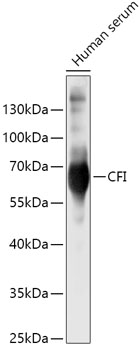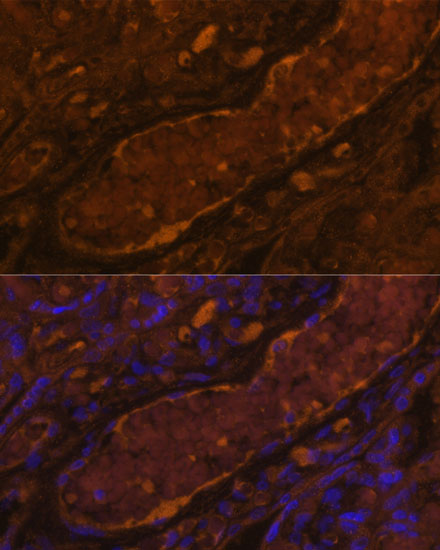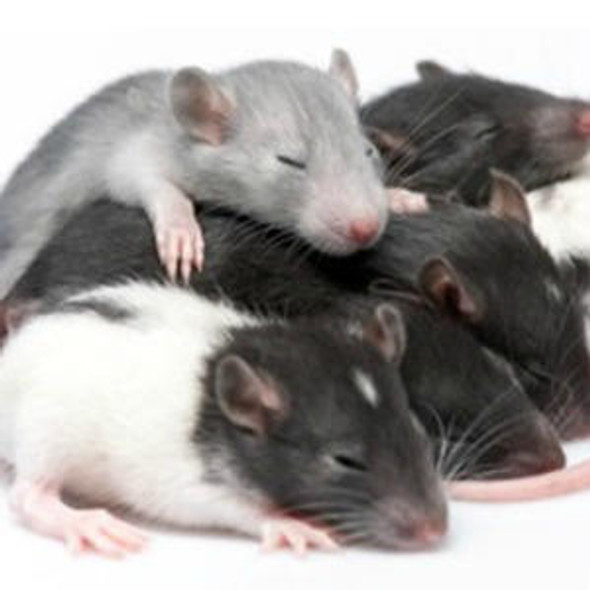Immunology Antibodies 2
Anti-CFI Antibody (CAB5623)
- SKU:
- CAB5623
- Product Type:
- Antibody
- Reactivity:
- Human
- Reactivity:
- Mouse
- Host Species:
- Rabbit
- Isotype:
- IgG
- Antibody Type:
- Polyclonal Antibody
- Research Area:
- Immunology
Description
| Antibody Name: | Anti-CFI Antibody |
| Antibody SKU: | CAB5623 |
| Antibody Size: | 20uL, 50uL, 100uL |
| Application: | WB IF |
| Reactivity: | Human, Mouse |
| Host Species: | Rabbit |
| Immunogen: | Recombinant fusion protein containing a sequence corresponding to amino acids 19-300 of human CFI (NP_000195.2). |
| Application: | WB IF |
| Recommended Dilution: | WB 1:500 - 1:2000 IF 1:50 - 1:100 |
| Reactivity: | Human, Mouse |
| Positive Samples: | Human serum |
| Immunogen: | Recombinant fusion protein containing a sequence corresponding to amino acids 19-300 of human CFI (NP_000195.2). |
| Purification Method: | Affinity purification |
| Storage Buffer: | Store at -20'C. Avoid freeze / thaw cycles. Buffer: PBS with 0.02% sodium azide, 50% glycerol, pH7.3. |
| Isotype: | IgG |
| Sequence: | KVTY TSQE DLVE KKCL AKKY THLS CDKV FCQP WQRC IEGT CVCK LPYQ CPKN GTAV CATN RRSF PTYC QQKS LECL HPGT KFLN NGTC TAEG KFSV SLKH GNTD SEGI VEVK LVDQ DKTM FICK SSWS MREA NVAC LDLG FQQG ADTQ RRFK LSDL SINS TECL HVHC RGLE TSLA ECTF TKRR TMGY QDFA DVVC YTQK ADSP MDDF FQCV NGKY ISQM KACD GIND CGDQ SDEL CCKA CQGK GFHC KSGV CIPS QYQC NGEV DCIT GEDE VGCA GFAS VA |
| Gene ID: | 3426 |
| Uniprot: | P05156 |
| Cellular Location: | Secreted, extracellular space |
| Calculated MW: | 65kDa |
| Observed MW: | 60kDa |
| Synonyms: | CFI, AHUS3, ARMD13, C3BINA, C3b-INA, FI, IF, KAF |
| Background: | This gene encodes a serine proteinase that is essential for regulating the complement cascade. The encoded preproprotein is cleaved to produce both heavy and light chains, which are linked by disulfide bonds to form a heterodimeric glycoprotein. This heterodimer can cleave and inactivate the complement components C4b and C3b, and it prevents the assembly of the C3 and C5 convertase enzymes. Defects in this gene cause complement factor I deficiency, an autosomal recessive disease associated with a susceptibility to pyogenic infections. Mutations in this gene have been associated with a predisposition to atypical hemolytic uremic syndrome, a disease characterized by acute renal failure, microangiopathic hemolytic anemia and thrombocytopenia. Primary glomerulonephritis with immune deposits and age-related macular degeneration are other conditions associated with mutations of this gene. |
| UniProt Protein Function: | CFI: Responsible for cleaving the alpha-chains of C4b and C3b in the presence of the cofactors C4-binding protein and factor H respectively. Defects in CFI are a cause of susceptibility to hemolytic uremic syndrome atypical type 3 (AHUS3). An atypical form of hemolytic uremic syndrome. It is a complex genetic disease characterized by microangiopathic hemolytic anemia, thrombocytopenia, renal failure and absence of episodes of enterocolitis and diarrhea. In contrast to typical hemolytic uremic syndrome, atypical forms have a poorer prognosis, with higher death rates and frequent progression to end-stage renal disease. Susceptibility to the development of atypical hemolytic uremic syndrome can be conferred by mutations in various components of or regulatory factors in the complement cascade system. Other genes may play a role in modifying the phenotype. Defects in CFI are the cause of complement factor I deficiency (CFI deficiency). CFI deficiency is an autosomal recessive condition associated with a propensity to pyogenic infections. Belongs to the peptidase S1 family. |
| UniProt Protein Details: | Protein type:EC 3.4.21.45; Secreted; Secreted, signal peptide; Protease Chromosomal Location of Human Ortholog: 4q25 Cellular Component: extracellular space; membrane; extracellular region; nucleus Molecular Function:serine-type endopeptidase activity; metal ion binding; scavenger receptor activity Biological Process: receptor-mediated endocytosis; regulation of complement activation; innate immune response; proteolysis; complement activation, classical pathway Disease: Macular Degeneration, Age-related, 13; Complement Factor I Deficiency; Hemolytic Uremic Syndrome, Atypical, Susceptibility To, 3 |
| NCBI Summary: | This gene encodes a serine proteinase that is essential for regulating the complement cascade. The encoded preproprotein is cleaved to produce both heavy and light chains, which are linked by disulfide bonds to form a heterodimeric glycoprotein. This heterodimer can cleave and inactivate the complement components C4b and C3b, and it prevents the assembly of the C3 and C5 convertase enzymes. Defects in this gene cause complement factor I deficiency, an autosomal recessive disease associated with a susceptibility to pyogenic infections. Mutations in this gene have been associated with a predisposition to atypical hemolytic uraemic syndrome, a disease characterized by acute renal failure, microangiopathic hemolytic anemia and thrombocytopenia. Primary glomerulonephritis with immmune deposits is another condition associated with mutation of this gene. [provided by RefSeq, Jul 2008] |
| UniProt Code: | P05156 |
| NCBI GenInfo Identifier: | 317373341 |
| NCBI Gene ID: | 3426 |
| NCBI Accession: | P05156.2 |
| UniProt Secondary Accession: | P05156,O60442, |
| UniProt Related Accession: | P05156 |
| Molecular Weight: | 583 |
| NCBI Full Name: | Complement factor I |
| NCBI Synonym Full Names: | complement factor I |
| NCBI Official Symbol: | CFI |
| NCBI Official Synonym Symbols: | FI; IF; KAF; AHUS3; ARMD13; C3BINA; C3b-INA |
| NCBI Protein Information: | complement factor I; C3b-inactivator; C3B/C4B inactivator; complement component I; light chain of factor I; Konglutinogen-activating factor; complement factor I heavy chain; complement control protein factor I |
| UniProt Protein Name: | Complement factor I |
| UniProt Synonym Protein Names: | C3B/C4B inactivatorCleaved into the following 2 chains:Complement factor I heavy chain; Complement factor I light chain |
| Protein Family: | Complement factor |
| UniProt Gene Name: | CFI |
| UniProt Entry Name: | CFAI_HUMAN |
View AllClose








